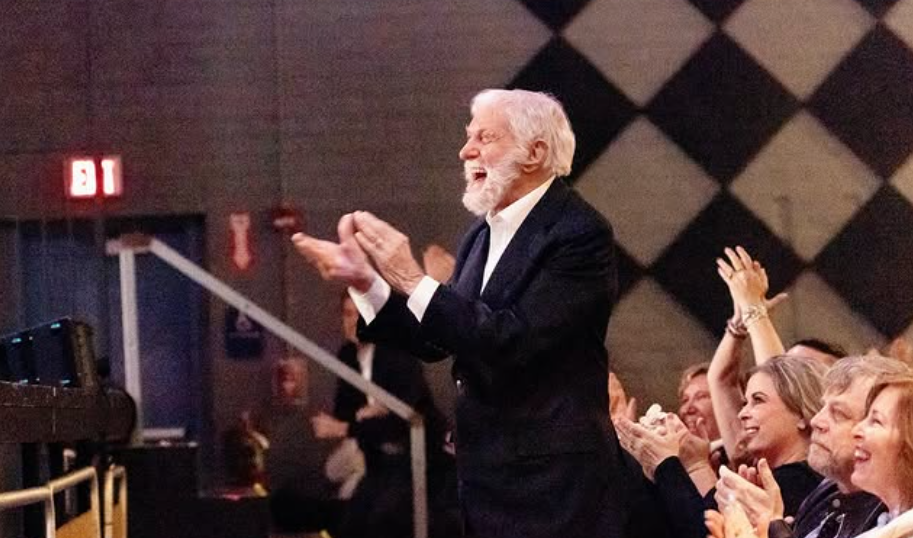What happens when you live long enough to see almost everyone you love disappear?
For most of us, reaching 100 sounds like a dream—balloons, media tributes, maybe a Guinness World Record mention. But for Dick Van Dyke, who turns 100 this December, that dream comes with a sharp edge. “That’s the curse of living to almost 100,” his wife Arlene said recently, after the loss of yet another close friend. He nodded in agreement: “I’ve lost a lot of friends.”
Van Dyke isn’t just one of the last entertainers of Hollywood’s golden era—he’s one of the last men standing from an entire generation of performers, creatives, and companions. His story raises a rarely discussed truth about longevity: living a long life often means grieving more of it.
With the number of U.S. centenarians projected to quadruple by 2055, Van Dyke’s reflections aren’t just personal—they’re a preview of what more people may face in the decades ahead. So what does it really mean to grow older when the world around you keeps disappearing? And how do you stay emotionally alive when so many chapters of your life have already closed?
The Emotional Toll of Outliving Your Generation
Longevity isn’t just about surviving the years—it’s about learning to live without the people who made those years meaningful. For Dick Van Dyke, now 99, this truth is no longer abstract. “I’ve lost a lot of friends,” he said plainly during a recent public appearance, reflecting on the death of longtime collaborator Ed Asner. The two had planned to remake The Odd Couple, a project that never materialized after Asner passed away in 2021. The disappointment wasn’t just about a missed opportunity—it was about losing one more thread in a long and shrinking network of deep, decades-long connections.
His wife, Arlene, summed it up bluntly: “He’s outlived everybody.” Her words are not sentimental—they’re factual. Van Dyke has outlived nearly all of his creative peers: Carl Reiner, Norman Lear, and now Asner. These weren’t just colleagues; they were part of his rhythm, his past, his support system. And the absence of those people is more than nostalgic—it’s disorienting.
This experience is more common than most people realize. Researchers call it cumulative loss—a series of repeated personal losses that occur as one ages. Unlike acute grief, which often follows one significant loss, cumulative grief is layered and ongoing. A study in The Gerontologist highlights how this form of grief can erode emotional resilience, especially for those who reach their 90s and beyond.
There’s a cultural assumption that if someone is fortunate enough to live to 100, they must be lucky. But emotional well-being doesn’t always align with physical health. Van Dyke’s calm demeanor and continued positivity don’t erase the reality that he’s endured a depth of loss most people never face. “Everybody I knew and worked with, there’s no one left,” he admitted in an earlier interview. That kind of grief isn’t dramatic—it’s quiet, persistent, and deeply personal.
A Public Health Concern
Dick Van Dyke may still be smiling in interviews and singing on stage, but the reality behind the curtain is more sobering: most of the people who shared his life and work are gone. What he’s experiencing is more than personal loss—it’s what gerontologists call social thinning, a gradual but persistent loss of close social ties as people age. And it’s not just emotionally difficult—it’s medically significant.
According to the Centers for Disease Control and Prevention (CDC), social isolation in older adults is linked to higher risks of heart disease, stroke, dementia, and premature death. The U.S. Surgeon General’s 2023 report took it even further, calling chronic loneliness a health crisis on par with smoking 15 cigarettes a day. These aren’t metaphorical comparisons. The physiological effects of long-term isolation include increased inflammation, weakened immune response, and changes in brain function.
Van Dyke’s situation reflects a growing national reality. While the average life expectancy for men in the U.S. is about 75, the number of people living past 90 is growing. As of 2020, there were more than 97,000 centenarians in the U.S.—a number projected to quadruple by 2055. As more people live longer, more will face what Van Dyke has: the quiet erosion of lifelong companionship.
This isn’t just about being alone. It’s about losing shared history—inside jokes, unspoken understanding, people who knew you across decades. That depth of connection is hard to rebuild, especially later in life. Van Dyke, despite his fame and continued public presence, still finds that new friendships don’t quite replace the old ones. As his wife Arlene noted, “He’s outlived everybody.” Even surrounded by fans and event attendees, the absence of long-trusted relationships can’t be filled by applause.
Experts in aging stress the importance of maintaining social engagement. Professor Rose Anne Kenny, a gerontologist at Trinity College Dublin, says that consistent social contact is “as important as giving up smoking” for aging well. But for someone in Van Dyke’s position—where most of his peers have passed—that advice is easier said than followed.
How Van Dyke Stays Grounded
Van Dyke’s emotional steadiness in the face of constant loss isn’t accidental. It reflects what psychologists describe as resilient aging—a combination of adaptability, emotional regulation, and continued purpose. He doesn’t sugarcoat the pain of losing people he loved, but he also doesn’t let grief consume him. Instead, he makes space for both loss and gratitude, allowing them to coexist.
One of the biggest pillars of his emotional balance is his relationship with his wife, Arlene. At 53, she’s nearly half a century younger, but their bond provides daily companionship and emotional grounding. Companionship like this is essential. Research consistently shows that emotional support from even one close relationship can buffer against depression and cognitive decline in older adults. Van Dyke’s marriage doesn’t just offer comfort—it helps him stay emotionally anchored.
Humor also plays a big role. Arlene has noted that her husband always finds something to laugh about—even when talking about the most uncomfortable parts of aging. It’s a skill, not a gimmick. Laughter, particularly self-directed humor, has been shown to reduce stress, boost mood, and even improve immune function. For Van Dyke, it’s more than entertainment—it’s medicine.
Then there’s movement. Van Dyke and Arlene still go to the gym three times a week. “I’ve always exercised,” he’s said in interviews. That consistency matters. Physical activity helps maintain not only strength and balance but also brain health. Exercise is known to increase levels of brain-derived neurotrophic factor (BDNF), a protein that supports cognitive function and mood regulation. For someone nearing 100, the payoff isn’t about aesthetics—it’s about staying sharp, steady, and emotionally well.
Why He Still Performs at 99
At nearly 100, he’s not slowing down—he’s still singing with his barbershop quartet, The Vantastix, attending public events, and even winning awards. In 2023, he became the oldest-ever Daytime Emmy winner for a guest role on Days of Our Lives, playing a man with amnesia. It was a short appearance, but it carried weight. Not just because of who he is, but because he’s still creating new work, not just reliving past roles.
“I’m a ham,” he said candidly. “I love it. I get a jolt of energy from an audience.” That joy isn’t nostalgia—it’s fuel. And it’s part of why Van Dyke continues to defy the typical script of old age.
Psychologists have long pointed to purpose as a key driver of healthy aging. People who maintain a clear sense of purpose tend to have better memory, lower rates of depression, and even reduced risk of mortality. In Van Dyke’s case, performance gives him structure, motivation, and a reason to keep showing up. It’s not about legacy. It’s about staying in motion—literally and emotionally.
His enthusiasm isn’t performative. When he danced in Mary Poppins Returns at 92, or popped up in a Coldplay music video at 98, it wasn’t to prove he “still had it.” It was because he enjoyed it. That intrinsic motivation is powerful. Studies show that when older adults engage in activities because they find them meaningful—not because they feel obligated—they experience greater life satisfaction and resilience.
Van Dyke’s late-life career isn’t just impressive—it’s instructive. Many people assume that aging means stepping back, winding down, or withdrawing. Van Dyke has done the opposite. Not because he’s trying to hold on to youth, but because creative expression remains one of the most energizing forces available to any age group. It keeps him mentally alert, emotionally engaged, and physically active. More importantly, it gives him joy. And in a stage of life where joy can be harder to find, that’s not just impressive—it’s essential.
Staying Socially and Mentally Engaged as You Age
Dick Van Dyke’s lifestyle offers more than inspiration—it offers a template. He’s not coasting on luck or genetics. He’s made conscious choices that keep him physically active, mentally sharp, and emotionally connected. While not everyone is a performer or public figure, the core of what keeps him going is accessible to most people. Here are practical ways to apply those principles to your own life, or help someone you care about do the same:
1. Prioritize Movement—No Matter Your Age
Van Dyke still hits the gym three times a week. You don’t need a personal trainer or intense routines to follow his lead. Regular movement—walking, stretching, light strength training—supports balance, brain health, and emotional stability.
2. Stay Social, Even When It Feels Easier to Withdraw
Social thinning happens naturally with age, but it doesn’t have to lead to isolation. Start small: reconnect with old friends, join a local group, or volunteer. Interaction—even casual—can make a measurable difference in your well-being.
3. Find—or Rediscover—Your Purpose
Whether it’s performing, mentoring, creating, or caregiving, having a sense of purpose improves cognitive function and emotional health. Van Dyke’s continued work in entertainment isn’t about staying relevant; it’s about staying engaged.
4. Laugh Often, and Don’t Take Aging Too Seriously
Humor is one of Van Dyke’s most valuable tools. It helps reframe difficulties and lighten emotional weight.
5. Stay Curious and Keep Learning
Van Dyke continues to take on new roles and performances, not because he has to, but because he wants to keep learning. Lifelong learning boosts brain health and gives you new topics to engage with socially.
Redefining What It Means to Age Well
Dick Van Dyke isn’t trying to outrun age—he’s living it on his own terms. At 99, he’s not pretending to be young, nor is he retreating into quiet retirement. He’s still moving, still creating, still finding reasons to laugh. His story isn’t about defying aging. It’s about reshaping what aging looks like.
Too often, longevity is framed as the ultimate health goal. But as Van Dyke’s life makes clear, the number of years isn’t the full picture. It’s what you do with those years that defines the quality of your life. He has faced loss after loss—friends, collaborators, dreams that didn’t come to pass. Yet instead of collapsing under that weight, he continues to engage with life: performing, connecting, reflecting, and moving forward.
His approach doesn’t ignore the hard parts of aging. It acknowledges them—and then acts anyway. That’s the real lesson. Aging well isn’t about pretending nothing changes. It’s about staying involved, curious, and emotionally open, even when it hurts.
For anyone facing the realities of growing older—or watching someone they love go through it—Van Dyke’s example is a reminder that vitality isn’t tied to age. It’s tied to attitude, effort, and how willing you are to keep showing up. Whether it’s singing on stage or simply reaching out to a friend, the act of participating matters.
So don’t just aim to live longer. Aim to live well. Keep moving. Stay connected. Find joy, even when it’s quiet. And like Van Dyke, if you can still dance—dance.
Featured Image from Instagram @official_dick_van_dyke















Leave a Reply